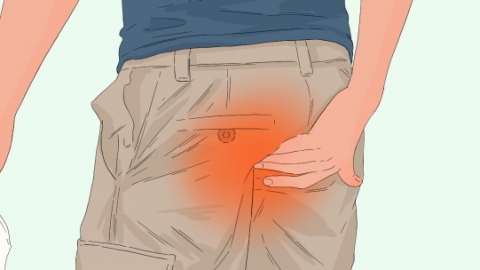What should I do if an anal fissure leads to a perianal abscess?
In general, anal fissures may lead to perianal abscesses due to bacterial invasion through the fissure, worsening infection from bowel movement irritation, poor perianal hygiene, diabetes, or low immunity. It is recommended to seek medical attention promptly, identify the underlying cause, and follow a doctor's guidance for improvement through general management, medication, and other treatments. Specific causes are analyzed as follows:

1. Bacterial invasion through the fissure: Anal fissures cause breaks in the anal canal skin, allowing bacteria from feces to enter the wound and trigger infection, which can progress to abscess formation. After defecation, gently clean the perianal area with warm water and avoid vigorous wiping. Pat the area dry with a clean soft cloth afterward to minimize bacterial residue.
2. Bowel movement irritation worsening infection: Hard stools or excessive straining during defecation repeatedly irritate the fissure, promoting the spread of infection and leading to abscess development. Increase intake of high-fiber foods such as dragon fruit and celery, drink 1800 mL of water daily, maintain soft stools, and reduce mechanical irritation to the wound during bowel movements.
3. Poor perianal hygiene: Delayed cleaning of the perianal area leads to accumulation of sweat and secretions, creating an environment conducive to bacterial growth and increasing the risk of infection and abscess formation. Perform warm sitz baths 1–2 times daily, and apply topical medications such as mupirocin ointment, fusidic acid cream, or compound polymyxin B ointment as directed by a physician.
4. Diabetes: Poor glycemic control reduces the body’s ability to fight infections, making anal fissures prone to severe secondary infections and abscess formation, while also delaying wound healing. Follow medical advice to use antidiabetic medications such as insulin injection, glimepiride tablets, or metformin sustained-release tablets, and strictly control blood glucose levels.
5. Low immunity: Chronic sleep deprivation, malnutrition, and similar factors weaken immune function, impairing the body’s ability to resist infection, which may result in recurrent or worsening abscesses. Surgical incision and drainage of the abscess may be required to remove pus and control infection. Simultaneously, increase protein and vitamin intake and maintain regular作息 (daily routines) to enhance immune function.
In daily life, avoid consuming spicy and irritating foods such as chili peppers and Sichuan pepper to reduce mucosal irritation in the perianal region. Wear loose, breathable cotton underwear, wash and change it frequently, and dry it in sunlight. Avoid prolonged sitting or standing; get up and move periodically to improve blood circulation in the perianal area and support recovery.




